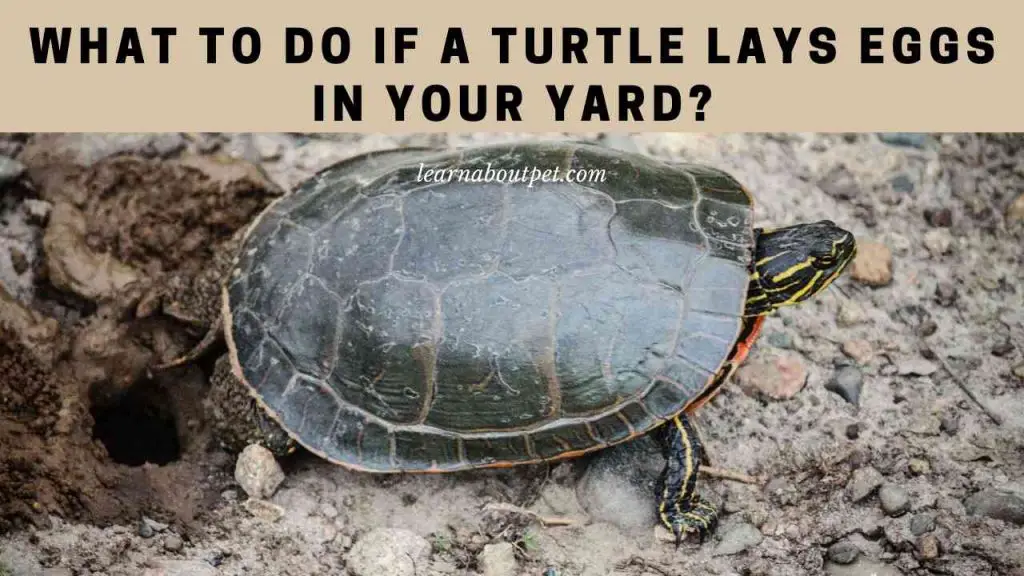Landowners who live near water sources may be bothered by a strange visitor. Turtles deposit their eggs in the earth and are on the move in search of nesting places when their native habitat diminishes. If your garden has loose sandy soil, a displaced turtle may think it’s a good spot to hide.
What to do if a turtle lays eggs in your yard? The best thing to do if you discover a turtle strolling about your property is to let it alone. If it’s a female, she’ll most likely be seeking for a suitable nesting site, and she’ll be fussy. If you’re lucky, she’ll dig a mound into which she’ll lay her eggs and then cover it up.
After then, the female departs till the next egg laying season.

Although most turtles are harmless, snapping turtle management may be important to protect children and pets. If you’re wondering “What to do if a turtle lays eggs in your yard,” keep reading for some advice on how to deal with turtles that are nesting.
It’s not every day that nature pays you a visit. Yes, I’m talking about turtles coming to your yard and laying eggs. Unfortunately, many people are baffled as to what to do when a turtle lays eggs in their yard.
If you’re not familiar with turtles, having one in your yard might be intimidating, especially if it’s a snapping turtle, which is notorious for its vicious bite.
What To Do If A Snapping Turtle Lays Eggs In Your Yard?
The wisest course of action is to ignore the eggs. Keep pets away from the nest and eggs so they don’t try to dig it up or consume the eggs. Pesticides, fertilizers, and other lawn chemicals should not be used near the eggs since they may damage them.
Now, what to do if a snapping turtle lays eggs in your yard then, The majority of eggs do not incubate for a variety of reasons. Small predators like raccoons and coyotes will dig them up and consume them first, as they can smell turtle eggs from a long distance.
The newborn turtles will head for the nearest water source if the eggs hatch successfully.
Let’s look at some important points on the situation, what to do if a turtle lays eggs in your yard.
How Do I Protect Turtle Eggs In My Yard?
Protecting the eggs gives turtles a fighting chance and helps to counterbalance some of the annual road deaths. Now the question arises how do I Protect turtle eggs in my yard?
A nest cage is one approach to keep a turtle nest safe. While nest cages can be used to protect certain nests in natural environments, they cannot be utilized to safeguard nests on roadsides since cages may obstruct traffic and road maintenance employees’ operations.
Turtles can dig their nests easily in the loose gravel and sand, and the sunny roadsides offer the essential warmth for the eggs to develop. Roadsides, on the other hand, can be hazardous to both the nesting mother and any hatchlings that may wind up on the road.
Also we need to understand what to do if turtle lays eggs in your yard?
Another alternative is to gather the eggs after they’ve been deposited and hatch them in a controlled environment.
Can You Move Turtle Eggs?
It might be quite a risky task if can you move turtle eggs. As a result, it is more crucial than ever to ensure the survival of turtle eggs. If eggs are not oriented correctly after being relocated, they may not develop. No matter what the habitat looks like, turtles should always be transferred in the direction they are facing, and nesting turtles should never be moved.
These turtle eggs do not need to be removed because they will hatch after three months or will mainly turn out to be sterile. However, if your conscience demands that they be removed, contact animal control and have them do so.
Completely taking care of the eggs is the only way without moving them. Likewise, the situation of what to do if a turtle lays eggs in your yard, falls under the same criteria.

How Long Do Turtle Eggs Stay In The Ground?
After all of the eggs have been placed, the female can spend many hours filling the hole before spending the remainder of the night under cover at the nesting site or returning to her home range that night. Now, you might be wondering with the same scenario of what to do if a turtle lays eggs in your yard?
The eggs will be incubated for around 2–3 months (60 days) before hatching. After hatching, the hatchlings stay in their nest cavity to absorb the yolk from the eggs. The hatchlings emerge once the yolk sac has been absorbed to continue their own adventure and find a home range.
How Long Does It Takes For Turtle Eggs To Hatch
Sea turtles hatch all year, but primarily in the summer. A carbuncle (temporary egg tooth) is used by hatchlings to help break open the shell.
Now, how long does it takes for turtle eggs to hatch. The juvenile turtles may take 3 to 7 days to dig their way to the surface after hatching. Now we might have got a clear idea what to do if a turtle lays eggs in your yard.
Hatchlings are most likely to emerge from the nest at night. When you emerge at night, you are less vulnerable to predators during the day. Some nests have been shown to produce hatchlings on more than one night, according to studies.
Where Do Freshwater Turtles Lay Their Eggs
As all turtles lay their eggs mainly depends on the turtle habitat, but where do freshwater turtles lay their eggs.?
The eggs are deposited in billabongs, which are seasonal lakes that vary between wet and dry conditions. Despite the fact that the eggs are placed underwater during the rainy season, the newborn turtles do not emerge until the waters have receded.
The eggs are hidden into muddy nests in shallow water and may live underwater for up to 12 weeks. On dry ground, the baby turtles emerge from their eggs and make their way back to the ocean.
How Many Eggs Do Box Turtles Lay?
From April through October, box turtles mate and lay their eggs, with nesting taking place from May to July. The average box turtle produces one clutch each year, with two to eight eggs in each clutch. Turtles make nests many inches below the surface of the ground.
Incubation lasts three months on average, however it varies depending on the temperature and moisture of the soil. The sex of the hatchlings is determined by the temperature of the nest, as it is in other turtle species. Females are more likely to be born in warmer nests, whereas males are more likely to be born in colder nests.
Might be you have cleared all your doubt regards what to do if a turtle lays eggs in your yard.
Final Verdict – What To Do If A Turtle Lays Eggs In Your Yard
Turtles travel far and wide every year in search of a dry environment to deposit their eggs. Unfortunately, out of hundreds of eggs, only a few of these eggs survive to adulthood.

Now what will be your role in what to do if a turtle lays eggs in your yard, you have two choices: one, give some cover and allow nature take its course, or second, call animal control and have them removed.
As a pet lover, make sure to learn about pet more and give your pet turtle a good and comfortable life!

Welcome to Learn About Pet. My name is Rajkumar Ravichandran and I love all pets, travel, and amazing food. I write about my passion and personal experience caring for multiple pets in this blog! ❤️
Post Disclaimer
DISCLAIMER: THIS BLOG OR WEBSITE, "Learn About Pet", DOES NOT PROVIDE YOU WITH MEDICAL ADVICE AND IS NOT A SUBSTITUTE FOR MEDICAL ADVICE. ALWAYS GET IN TOUCH WITH YOUR PERSONAL VETERINARIAN AND USE INFORMATION HERE AS GENERAL ADVICE.
The information, including but not limited to, text, graphics, images and other material contained on this website are for informational purposes only. No material on this site is intended to be a substitute for professional veterinary advice, food recommendation, diagnosis, or treatment. Always seek the advice of your veterinarian or other qualified health care provider with any questions you may have regarding a medical condition or for pet food related questions.







